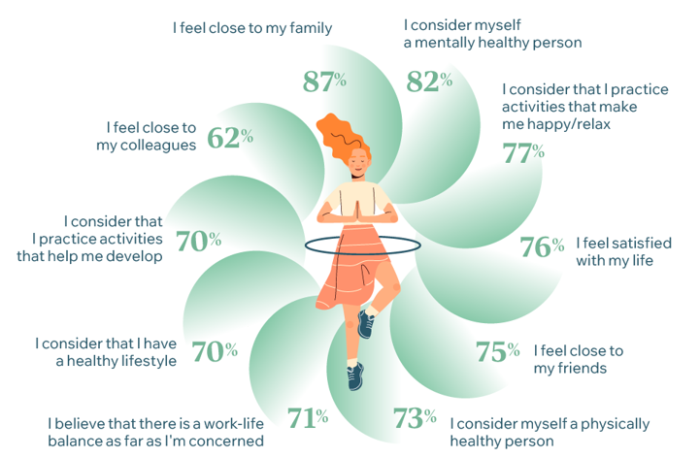Healthy lifestyle: perceptions and practices among Romanians
Whether Romanians adopt specific behaviours of a healthy lifestyle or not, most of them already have a clear idea of what a daily routine should include to maintain both physical and mental health.
In this context, more and more Romanians are turning their attention to practices aimed at ensuring a balanced life.
For maintaining physical health, they consider essential: adequate rest, avoiding vices, proper hydration, a balanced diet, regular physical activity, and personal hygiene. However, annual medical check-ups and paying attention to the body’s signals – crucial for prevention – are prioritised to a lesser extent, with differences of 20 and 10 percentage points respectively compared to other practices.
Women tend to pay more attention (compared to men) to dietary supplements, sun protection, and monitoring body weight, thus showing a more detailed approach to maintaining overall health.
Mental health: a pragmatic approach
Regarding mental health, Romanians believe it is mainly supported by outdoor activities and healthy relationships with family and friends, thus highlighting the essential role of social connections. Concrete and tangible solutions are preferred, reflecting a more pragmatic approach to mental well-being.
In contrast, interest in spiritual and emotional activities, such as meditation, yoga, or therapy, remains low. Therapy, for example, is chosen by only 10% of Romanians. This trend suggests that in Romania, mental health is approached through direct solutions and less through introspective practices.
Prevention and social well-being: an under-appreciated priority
Although Romanians are aware of the importance of a healthy lifestyle, medical prevention and aspects related to social and emotional well-being often remain under-appreciated. Many do not prioritise regular check-ups and doctor visits, and a reduced number report frequently meeting friends, consuming dietary supplements, practicing a sport, or attending therapy sessions.
However, family relationships are seen as an important pillar of well-being: 87% of Romanians consider they have a close relationship with their family, and 82% perceive themselves as mentally healthy, these being the highest reported scores. Nevertheless, mental health is often associated only with the absence of severe mental illnesses, without considering factors such as anxiety, emotional traumas, or stress – elements that can significantly affect mental well-being.
These data indicate a need for education and information regarding the benefits of prevention and a comprehensive approach to mental health, which should include both social relationships and effective stress and emotion management.
Life and work satisfaction
Analysing more closely the general satisfaction, we observe a downward trend among Romanians in terms of leisure time (recreational activities and time spent with friends), overall life satisfaction, workplace conditions, and physical health.
Use of dietary supplements
In Romania, approximately 70% of Romanians state that they use dietary supplements, a behaviour likely amplified by the COVID-19 pandemic, which increased interest in strengthening the immune system. Despite the abundance of information available online, many prefer to follow the advice of doctors and authorised specialists.
They often purchase supplements from physical pharmacies, probably due to the personalised advice offered by pharmacists. Among the most popular supplements are Magnesium, Vitamin C, and Vitamin D, with most consumers opting for capsule or tablet forms.
Methodology
The study “Health under the microscope: dietary supplements and lifestyle” was conducted by Starcom Romania media agency, in October 2024, using the CAWI (Computer Assisted Interviews) method on a nationally representative sample of 600 Romanians aged 18+ years old.
It is part of the HumanGraph Experience studies, a research tool for analysing and understanding human behaviour across different contexts, focusing on collecting and visualizing relevant data.
The extended version or additional information can be requested at consumer@starcomww.com.
Photo header @Unsplash
 All Publicis Groupe Romania proprietary data tools in one place.
All Publicis Groupe Romania proprietary data tools in one place.Discover the power of our tools and feel free to get in touch.












